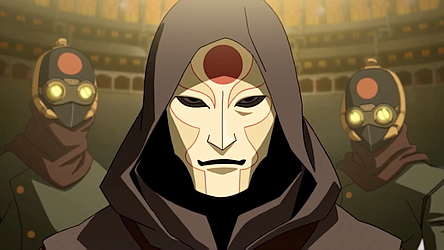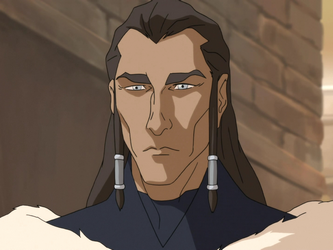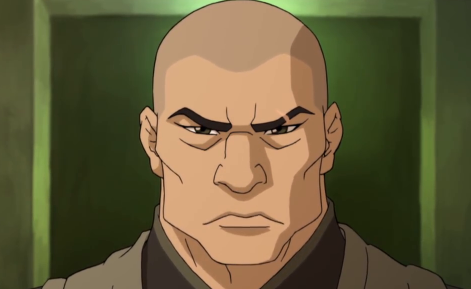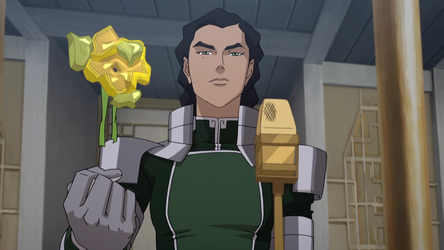NOTE: SPOLIERS FOLLOW
Book One: Amon
Amon is the first villain of The Legend of Korra, and we meet him in the very first episode of the show. Amon is the leader of the Equalists, a rather cult like organization hell bent on toppling the pro-bender government regime in Republic City. Amon has the ability to take away the bending abilities of others, and who believes that all benders should lose their bending abilities in order to make society “equal.” Unfortunately for our heroes, the Equalists do not believe in non-violent protests and sit-ins. Their members are highly trained and have access to rather powerful weaponry such as tasers, tanks and planes.
What I love about Amon is that he brings up an interesting question: “How do non-benders feel in a bender dominated society?” It is certainly not a question I considered when I watched The Last Airbender at age 12; I was too busy watching Aang smite fools with his amazing airbending abilities. The more you think about it however, the more obvious the problem becomes. Republic City was originally ruled by a council of four benders, one from each of the four nations. The monarchy of each nation generally had bending abilities, and most armies consisted primarily of benders. When you think about it this way, you realize that non-benders are seriously disenfranchised, reduced to nominal roles in society. Suddenly Amon doesn’t seem so evil. That is, before he starts blowing up buildings….
Book Two: Unalaq
Yes, yes I know, no one likes the second season, but there are lessons to be learned from Unalaq. Unalaq is the Chief of the Northern Water Tribe, and at the beginning of the second season visits the Southern Water Tribe, Korra’s home. Unalaq is disgusted to discover that the Southern Water Tribe has no longer follows the ancient traditions and no longer worships the Spirits. Unalaq believes that the Southern’s lack of piety is the cause of recurring dark spirit attacks. Korra attempts to diffuse the situation, but Unalaq is so angry that he orders the Northern Water Tribe Fleet to blockade the South Pole, in order to properly teach the Southerners a lesson.
Unalaq is a classic religious extremist, who believes in pushing his views on others. In the world of Avatar, there really is no specific canonized religion, but a general set of traditions and respect surrounding spirits do exist. Unalaq turned out to be partially correct: the dark spirits attacks were caused by a lack of respect and worship of the spirits, but unfortunately for Korra Unalaq wanted to release the spirits to harness their power for his own maniacal purposes.
Book Three: Zaheer
Zaheer is the best villain in The Legend of Korra. Few TV shows and movies have ever dared to feature an anarchist as the main villain, out of fear of the negative connotations of the word. Zaheer is a criminal who gains the ability to airbend after the events in Book Two, escapes his high security prison and assembles a team of highly trained benders to capture the Avatar and use her for unknown purposes. As the book progresses, Zaheer makes it clear that he does not want money or power. Instead he wants to tear down all the world’s leaders and free common people from abusive monarchy. His primary target is the Earth Queen, the ruler of the Earth Kingdom. The Earth Queen is the archetype of a terrible rule, levying heavy taxes to fund her own luxurious lifestyle while the people of the Earth Kingdom starve. Zaheer’s plan is to take out the Earth Queen so the people of the Earth Kingdom can finally be free from the reign of tyrannical queen. However, Zaheer intends to take his plans a step further by also taking out the Avatar so that mankind can be completely free.
Zaheer is the best kind of villain: philosophical, powerful, and unpredictable. He often quotes the work of Guru Lagima, an ancient air bending master, stating “Let go your earthly tether, enter the void.” Initially, Zaheer’s plans sound fairly reasonable, as after seeing the widespread poverty and suffering in the Earth Kingdom one can sympathize with his hatred for authority. Zaheer even manages to literally “tear down the walls of the establishment” by having one of his teammates destroy the walls in Ba Sing Se separating the poor neighborhoods from the rich neighborhoods. The problem with Zaheer’s plan is the main problem with most anarchist’s plans: they go too far, and don’t really consider the long term consequences.
Book Four: Kuvira
Ah Kuvira, the good old fascist. After the event in Book Three, the Earth Kingdom is in turmoil. The monarchy has fallen, and the Earth Kingdom is stricken with mass poverty, starvation and attacks by roving groups of bandits. Kuvira rises out of the chaos to bring order. Sbe is a young lieutenant from Zaofu, the city of Metalbenders. During the absence of the Avatar, Kuvira initiates a coup, taking over the armies of Zaofu, and sets out on a high speed train through the Earth Kingdom, bent on restoring stability to the continent. With the superior technology and highly trained army of Zaofu, Kuvira successfully stabilizes most of the Earth Kingdom, arresting bandits, providing food to starving towns, and restoring communication throughout the kingdom. Kuvira’s intentions prove to be less than 100% altruistic, as she forces the governor of each district she stabilizes to swear loyalty to her, and grows her sizable military force through forced enlistment, and eventually aims to take over the United Republic despite the fact that the Republic is a sovereign nation outside of the Earth Kingdom. Despite her power hungry tendencies, Kuvira is a surprisingly good leader, reorganizing and repairing the majority of the Earth Kingdom in three years, leading to the rather uncomfortable conclusion that fascists may be effective leaders in certain times of crisis.




 RSS Feed
RSS Feed
